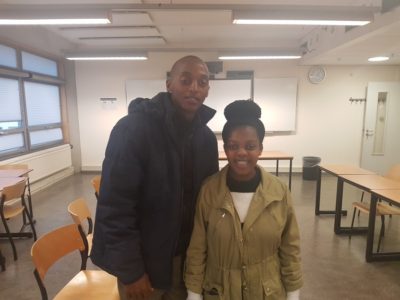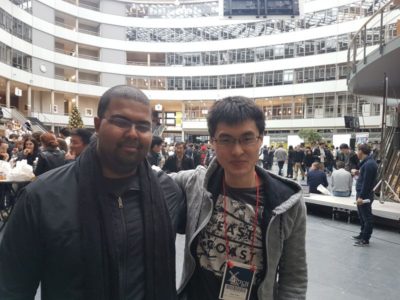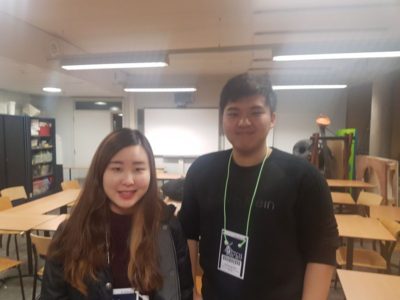Debaters at WUDC – Part 2
The second day of the World Universities Debating Championship in The Hague is coming to an end and of course the Achte Minute was there once again and has interviewed some of the participants from all around the world. Today six people from three continents were interviewed and there will be more coming the following days. The interviews were conducted by Helena Hecke.
In this part you can find the interviews with:
Ngozi Sibulele and Inga Macingwano – South Africa
Charles Lewis and Alan Chan – Canada
Minji Kim and Do Hyung Shin – South Korea
Ngozi Sibulele and Inga Macingwano – South Africa

Ngozi Sibulele (left) and Inga Macingwano – © Helena Hecke
AM: Which University are you from and does your debating society have a special name?
IM: We’re from the University of Fort Hare and it has no special name.
AM: How long have you been debating?
IM: It’s my second year.
NS: For me, too.
AM: How many tournaments did you go to so far?
IM: This is my first international tournament, but nationally I went to around 10.
NS: National four and this is my first international tournament.
AM: What’s your biggest success at a tournament so far?
IM: We broke at a few national ones.
AM: Why did you start debating?
IM: Because I wanted to challenge myself. I like to communicate with larger crowds, so I used this to practise.
NS: I’m too lazy to study. So I thought debating would get me to study, because you always need to learn new things. So I started debating, cause it fits well with my education.
AM: Why are you still debating?
IM: You fall in love with it, cause it’s fun and adrenaline and challenging.
AM: How is debating in your debating circuit?
IM: Motions vary. Mostly they’re based on what is currently happening and we have quite a few tournaments. There are official tournaments and the institutions also host their own. In a year you can attend more than five.
AM: How do your tournaments compare to worlds apart from size?
NS: I think there is a lot of sophistication here in terms of the systems that are used. For example tabbie. We don’t use such systems. Secondly our tournaments are more social. Here everything has to follow some order or institution, but local tournaments are quite relaxed and we just know what to do.
IM: But in general it’s similar and the motions are basically the same, although ours are more interactive and Worlds hasn’t been this interactive. We also debate BP.
AM: What do you love most about debating?
NS: I love speaking with other people and I like the parties. Debater know how to party.
AM: True.
IM: For me: I just love learning new stuff and to have these Aha!-moments and the people you meet in your circuit. You become like a family.
AM: How would you describe debating in less then 6 words?
NS: Challenging, fun, competitive,…
AM: What’s your impression of Worlds so far?
IM: I had high expectations and when I got here I was excited and I love the rush.
NS: For me I would have wished it was more centralised. It broke the debating spirit and it would have your prepared better. Other than that I think the tournament is great and yeah the food is pretty good.
IM: No it’s not.
NS: Because it’s a lot of bread.
AM: What’s the most striking experience you had so far?
NS: I’ve been schooled. By a lot of people, and this tournament has showed me that I still have a very long way to go in terms of debating and I really appreciate to see how others approach speeches.
IM: For me It would have to go to the logistics. For me the tournament is very elite and it isn’t for people from backgrounds that can’t afford and it’s sad that debating is becoming very elite.
AM: Thank you for the interview! Good luck with the rest of the tournament!
Alan Chan and Charles Lewis – Canada

Charles Lewis (left) and Alan Chan – © Helena Hecke
AM: First of all: Which institution are you from?
CL: The University of Alberta.
AM: How much debating experience do you have?
AC: I’ve done three years of high school debating and this is my third year of university debating.
CL: I’ve actually done the same amount. We’ve met in high school.
AM: And how many tournaments have you been to, roughly?
AC: Each year I’d say a university average of four or five.
CL: Maybe even five or six. So this would be my 15th or 16th.
AM: What was your biggest success in debating so far?
AC: We’ve actually done pretty well this year in terms of the tournaments. We’ve broke to the final of one of the bigger tournaments in the country and broke at some others.
CL: And then I broke to semis to the national competition.
AM: And is this your first WUDC?
AC: Yes.
CL: Yes.
AM: Why did you start debating in the first place?
AC: At our high school there was a debating class and why I signed up was that I thought it was kind of interesting. I was always interested in public speaking and basically learning things about the world and how to make good arguments.
CL: Public speaking terrified me as a highschooler but I loved argueing with people so I joined the class and I got to into the club and I loved the people and so between enjoying debate and enjoying the people got stuck around.
AM: And why are you still debating?
AC: Well, all the reasons still apply: I still like learning about the world, I still want to be as convincing as possible but also meeting the community. I like the people from all around the world, the gathering at tournaments. The rounds are fun, the socials afterwards are fun, you get to make a lot of unique friends that you wouldn’t meet otherwise… I also just love our debating circuit family and debating’s just become my biggest passion, it’s like my favourite sport.
AM: So, what does the debating circuit in Canada look like?
AC: We are in the western region, there are comparatively fewer tournaments in the western region compared to the central region, but there are still some tournaments around. In terms of motions it’s probably similar to what we can observe at Worlds, a variety of economics, IR, feminism, etc.
AM: And how does it differ from what we see at Worlds apart from size and what people are coming?
CL: We have a second style for the second part of the year, which is Canadian Parliamentary. It’s starting like the first half of BP but then you take the whip speaker and tack them to the end but they only get half the time and can’t take POIs. The interesting part is that you trust the government with the motions because they have to bring and set up their own motions.
AC: Which is really interesting!
AM: So apart from that it’s close to the Dutch Parliamentary which they did at Masters?
CL: Yeah, kind of.
AM: What do you love most about debating?
CL: I think I like to see different people’s analysis and the way they link things together, and also hanging out with them afterwards.
AC: I like to make explicit implicit feelings I’ve had my entire life, like especially in the genocide round we did arguments about the importance of dignity and autonomy, those are especially appealing to me.
AM: If you had to describe debating to somebody who never debated in just six words or less?
[silence]
AM: It could also be seven.
CL: You get to argue but also have fun and make friends.
AC: Try to be the smartest person in the room.
AM: What is your impression of Worlds so far?
AC: Phenomenal!
CL: Yeah. Like: I’m having fun. It’s pretty much like a really big version of our tournaments, which is something I could never imagine because we already have logistic issues at our small tournaments to begin with.
AM: And what was your most striking experience at Worlds?
AC: Having to pay for water.
CL: 10€ for a bottle is entirely robbery.
AM: Thank you for the interview and good luck with the next rounds!
Minji Kim and Do Hyung Shin – South Korea

Minji Kim (left) and Do Hyung Shin – © Helena Hecke
AM: Which university are you from and what is your debating society’s name?
DHS: Seoul National University. Our name’s just Seoul National University Debating Institution.
AM: How long have you been debating so far?
MK: Less then a year.
DHS: Yes. Less then a year.
AM: You’re really impressive for so little experience!
AM: How many tournaments have you been to?
DHS: This is our third.
MK: Yes. This is my third.
AM: Did you break at any of these tournaments?
DHS: Yes. We broke at the national. But it’s just tiny, so…
AM: Why did you start debating in the first place?
DHS: That’s a hard question. I started, because I was good in English at school. That’s really why they made me.
MK: I did, because I did it in middle school and then I remembered and wanted to do it in college, too.
AM: And why are you still debating?
DHS: You know, I have no idea. I have no idea, why I’m still stuck around. It’s fun, it’s interesting, it’s invigorating and it’s also tiring.
MK: It has pros and cons.
AM: How does debating look like in your circuit?
DHS: For the first semester we do AP style. Asian Parliamentary.
AM: What exactly does it look like?
DHS: It’s three on three, like Australs and then the second semester is BP.
AM: How are your tournaments compared to worlds?
DHS: They’re quite the same.
MK: We also debate from Worlds motions.
AM: What do you love most about debating?
DHS: It’s a legitimate way to fight people, which is hard.
MK: I guess like thinking with logic.
AM: If you’d have to describe debating to someone who never debated in just six words, what would you say?
DHS: Welcome to hell, suckers!
MK: Why are you so strange?
DHS: No. I’m kidding.
MK: Debating is a way to win your family arguments.
AM: What are your impressions of Worlds so far?
MK: I really like that I can meet diverse people and see, yeah.
DHS: I guess different debating culture, cause I guess the Korean circuit is a small one and we kind of have very similar views and arguments and how we present things and it’s kind of different at an international circuit.
MK: It’s very different. It’s world-focused.
AM: What’s the most striking experience you had so far in specific?
DHS: The opening ceremony. It was very… interesting… and I enjoyed watching the food.
MK: Same thing. We waited for two hours for food. It was interesting.
AM: Thank you so much and a lot of luck for the rest of the rounds!
hh./lok.





